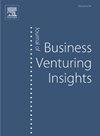Localizing humanitarian aid: A rapid response entrepreneurship model
Q1 Business, Management and Accounting
引用次数: 0
Abstract
This rapid response research develops the localized aid model—a distinct approach pioneered by new entrants in the humanitarian aid sector—for the problem owner Field Ready, an entrepreneurial NGO innovating the humanitarian supply chain and empowering local social infrastructure. Unlike traditional aid organizations and spontaneous venturing, the localized aid model embeds entrepreneurship as an organizing logic to address crisis needs through local manufacturing, human-centered design, partnerships, and capacity-building. We position the localized aid model as a third approach in the entrepreneurship literature on humanitarian response. Drawing on social enterprise, organizational resilience, and crowdsourcing research, we advance the model theoretically and show how it can support localized decision-making, integrate with civic infrastructure, and garner acceptance in differing institutional contexts. By equipping aid ventures to measure the degree of localization—defined as agency and ownership of local actors—we highlight how entrepreneurial organizing can foster community resilience as a civic outcome. This research helps Field Ready and similar ventures articulate their innovative model to stakeholders while offering a framework for system-level change in the aid sector.
人道主义援助本地化:快速反应创业模式
这项快速反应研究为问题所有者Field Ready开发了本地化援助模式,这是一种由人道主义援助领域新进入者开创的独特方法。Field Ready是一家创新人道主义供应链并赋予当地社会基础设施权力的创业型非政府组织。与传统的援助组织和自发冒险不同,本地化援助模式将企业家精神作为一种组织逻辑,通过本地制造、以人为本的设计、伙伴关系和能力建设来解决危机需求。我们将本地化援助模式定位为关于人道主义反应的创业文献中的第三种方法。借助社会企业、组织弹性和众包研究,我们从理论上推进了该模型,并展示了它如何支持本地化决策、与市政基础设施相结合,以及如何在不同的制度背景下获得认可。通过装备援助企业来衡量本地化程度(定义为地方行动者的代理和所有权),我们强调了企业家组织如何作为公民成果促进社区恢复力。这项研究有助于Field Ready和类似的企业向利益相关者阐明其创新模式,同时为援助部门的系统层面变革提供一个框架。
本文章由计算机程序翻译,如有差异,请以英文原文为准。
求助全文
约1分钟内获得全文
求助全文
来源期刊

Journal of Business Venturing Insights
Business, Management and Accounting-Business and International Management
CiteScore
11.70
自引率
0.00%
发文量
62
审稿时长
28 days
 求助内容:
求助内容: 应助结果提醒方式:
应助结果提醒方式:


